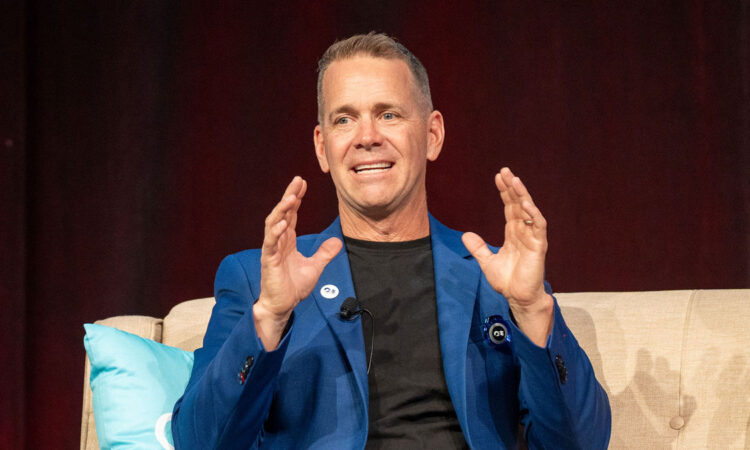HOLLYWOOD, FLA. — Princess Cruises president John Padgett was credited with leading the development of the MagicBand, one of the travel industry’s first wearables, when he worked for Disney.
Similarly, he drove the creation of Princess’ Ocean Medallion when he was chief experience and innovation officer at Carnival Corp.
But he told an audience of travel technologists attending the Phocuswright Conference on Tuesday that his focus has never been on technology but about finding new ways to address guest experience.
“It’s not about finding a better gimmick, it’s about business strategy,” he said. “It’s about truly getting to personalization at scale. When people talk about personalization, they think about putting your name on an email, but that experience is not unique to you. It doesn’t consider your needs, wants and desires in real time.”
But if you do that, he said, you create value. “It’s about the experience that the technology enables, not about technology. That’s one of the most misunderstood things.”
Padgett said that more data is captured on a single cruise today than had been created during most of the existence of the cruise industry. “But capturing a lot of data doesn’t make you any smarter,” he continued. The key, he said, is to convert that data into real-time intelligence and action. “That’s what we’re currently focused on. We’re really good at it, but need to become better at it.”
And that’s where machine learning and artificial intelligence come in, he said. “Those technologies accelerate your progression through data, information, intelligence and action. The key is to get to that action at the right moment in time.”
Where traditional customer relationship management models get it wrong, he said, is that they want to create a profile and then market to the profile. “They want to stick you in a box,” he said. “But in travel, every individual has many personas, based on who they’re traveling with at any point in time. You’re a much different person when you’re traveling with your children than when you’re with your husband, or alone, or with college friends.” That, he said, is why it’s critical to get information that reflects the person in real time.
As for the nature of innovation, Padgett said that “a lot of times people think about innovation as a project. They do the project, it’s innovative, and they think they can check innovation off their list and move on. The way I see it, the world is very dynamic. Consumers are very dynamic. The market is very dynamic. Technology is always changing.
And you have to have the mindset that you’re constantly aware that you’re never quite there with innovation in all these aspects and with the brand as a whole.”
Direct versus travel advisors
Asked by interviewer Mitra Sorrells, editor in chief of PhocusWire, whether he provides incentives to guests who book direct rather than through a travel advisor, Padgett said he seeks “balance” among channels.
“I hear about optimization of channels all the time. I don’t worry about that at all. I worry about maximization of throughput of all the channels,” he said. “Basically, I want my product and experiences and opportunities to be available in any way anyone wants to engage with them. If a client wants to work with a travel advisor, great. If direct or through a loyalty program, great. It’s all good with me.”
Overtourism and sustainability
On the topic of cruise ships contributing to overtourism, Padgett conceded “that’s a tough one.”
“There are certainly instances where you see that,” he said. “But overall, were talking about hundreds and hundreds and hundreds of destinations around the world. So, the antithesis is also true. Princess ships call at some South Pacific islands where cruise ships would represent 90% of their gross domestic product. You have to think about both extremes, and I think the cruise industry does.”
But when it comes to sustainability, he made no concessions.
“From a sustainability standpoint, if there is any municipality in this country that could come remotely close to what a cruise ship does, I’d like to see ’em,” he said. “And I’m talking about recycling. I’m talking about food waste. I’m talking about chemical management. I mean, across the board, we’re as good as it gets. No one’s perfect, and we’re dealing with massive machines. Internal combustion is still a thing. But I think that from a sustainability standpoint, the world has a lot to learn from us.”
A lightning round
To close the interview, Sorrells asked Padgett some fill-in-the-blank questions:
Q: “If I were running an airline …”
A: “…I’d be relentless, relentless, relentless to get rid of the hassle. It’s a tough space, an intense space, but at the end of the day, you’ve got to take the hassle out of the experience.”
Q: “If I were running a hotel …”
A: “… I’d reengage with consumers. You can automate any function, but if you’re not conveying a real experience, then what’s the difference between your brand and other brands? I travel and stay in a lot of hotels. Who’s engaging with me? What is their mission and purpose?”
Q: “If I were running an OTA …”
A: “… I’d sell a lot more Princess cruises!”
Source: Read Full Article
